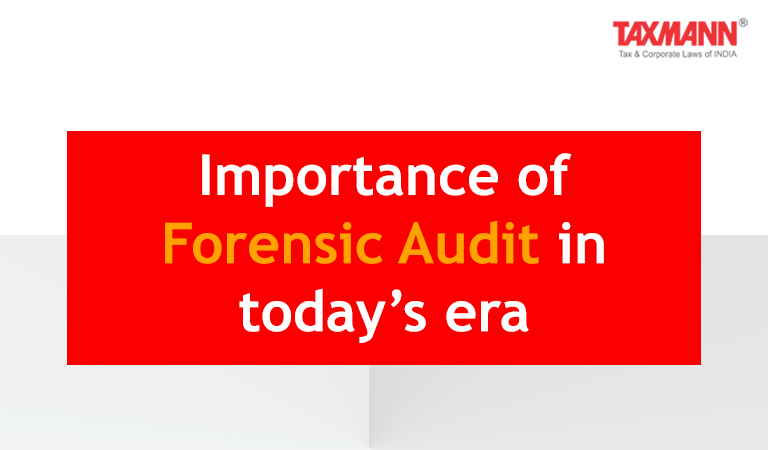Importance of Forensic Audit in today’s era
- Blog|News|Account & Audit|
- 2 Min Read
- By Taxmann
- |
- Last Updated on 4 March, 2022

Introduction:
Forensic Audit means an audit in the area of finance which calls for specified skills to detect financial accuracy of any data and to derive evidences which can be used in a Court of law or in any legal proceedings. It includes investigation, examination, calculation of data, creation of evidence in such a manner that it can stand as evidence before any court of law.
Objectives of Forensic Auditing:
a) To use the Auditor’s conclusions to facilitate a settlement or claim, or jury award by reducing the financial component as an area of continuing debate.
b) To avoid fraud and theft.
c) To restore the public confidence.
d) To enhance and improve the Corporate Governance policy.
Greater importance of Forensic Audit:
Forensic Audit is assuming greater importance in India and also globally in the wake of numerous financial frauds, unethical business practices and high incidence of cybercrime. In almost every sector and in verticals, there has been some financial frauds and white-collar crimes, which has paved the way for introducing and adopting the Forensic Audit.
Conclusion:
A forensic auditor requires expertise not only in accounting and auditing procedures but also expert knowledge regarding the legal framework. A forensic auditor should have specialized knowledge to have an understanding of various frauds that can be carried out and of how evidence needs to be collected. There are different types of fraud that a forensic auditor is expected to investigate. The investigation is likely to lead legal proceedings against one or several suspects, and members of the investigative team must be comfortable with appearing in court to explain how the investigation was conducted, and how the evidence has been gathered.
Click Here To Read The Full Article
Disclaimer: The content/information published on the website is only for general information of the user and shall not be construed as legal advice. While the Taxmann has exercised reasonable efforts to ensure the veracity of information/content published, Taxmann shall be under no liability in any manner whatsoever for incorrect information, if any.

Taxmann Publications has a dedicated in-house Research & Editorial Team. This team consists of a team of Chartered Accountants, Company Secretaries, and Lawyers. This team works under the guidance and supervision of editor-in-chief Mr Rakesh Bhargava.
The Research and Editorial Team is responsible for developing reliable and accurate content for the readers. The team follows the six-sigma approach to achieve the benchmark of zero error in its publications and research platforms. The team ensures that the following publication guidelines are thoroughly followed while developing the content:
- The statutory material is obtained only from the authorized and reliable sources
- All the latest developments in the judicial and legislative fields are covered
- Prepare the analytical write-ups on current, controversial, and important issues to help the readers to understand the concept and its implications
- Every content published by Taxmann is complete, accurate and lucid
- All evidence-based statements are supported with proper reference to Section, Circular No., Notification No. or citations
- The golden rules of grammar, style and consistency are thoroughly followed
- Font and size that’s easy to read and remain consistent across all imprint and digital publications are applied



 CA | CS | CMA
CA | CS | CMA
